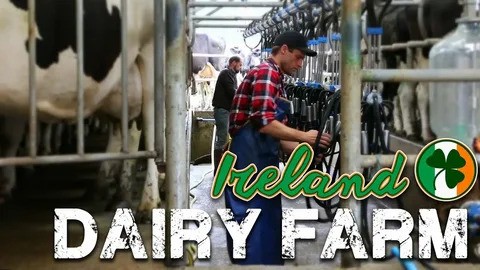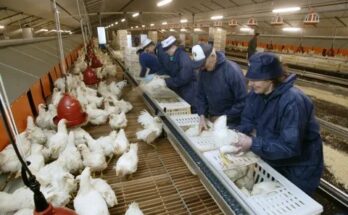Farm Jobs in Ireland
Farm jobs in Ireland have long been an integral part of the nation’s economy and cultural heritage. With its lush landscapes, rolling hills, and fertile soil, Ireland is known for its rich agricultural tradition. Farming remains a vital industry, providing employment opportunities for locals and seasonal workers alike. In this blog, we’ll delve into the types of farm jobs available in Ireland, the skills and qualifications required, the benefits and challenges of working in agriculture, and how to navigate a successful career in this rewarding field.
Overview of Farming in Ireland
Agriculture is a cornerstone of the Irish economy, contributing significantly to the country’s GDP and employing around 5% of the workforce. The sector encompasses a variety of farming practices, including:
- Dairy Farming: Ireland is renowned for its high-quality dairy products, with dairy farming being one of the most significant agricultural sectors.
- Beef and Sheep Farming: Beef and sheep farming are also crucial, with Ireland exporting a substantial amount of beef to international markets.
- Crop Production: While less dominant than livestock farming, crop production, including cereals and vegetables, plays an essential role in Irish agriculture.
- Horticulture and Landscaping: This includes the cultivation of flowers, plants, and landscaping services, catering to both domestic and commercial markets.
- Organic Farming: The organic sector is growing, with more farms adopting sustainable practices to meet consumer demand for organic products.
With such a diverse agricultural landscape, farm jobs in Ireland vary widely, providing numerous opportunities for individuals with different skills and interests.
Types of Farm Jobs in Ireland
1. Farm Labourer
Overview: Farm labourers perform various tasks on a farm, including planting, harvesting, feeding animals, and maintaining equipment. This role is often physically demanding and requires working outdoors in various weather conditions.
Requirements:
- No formal qualifications are needed, but experience in manual labour is beneficial.
- A strong work ethic and the ability to work as part of a team.
- Basic knowledge of farm machinery and tools can be advantageous.
2. Dairy Farmer
Overview: Dairy farmers manage the production of milk and dairy products. Responsibilities include milking cows, maintaining herd health, and managing feeding and breeding programs.
Requirements:
- A background in agriculture or animal husbandry is often preferred.
- Knowledge of dairy farming practices, animal welfare, and health management.
- Strong organizational skills to manage farm operations efficiently.
3. Livestock Farmer
Overview: Livestock farmers raise animals for meat, wool, and other products. This role involves caring for animals, monitoring their health, and managing breeding and feeding practices.
Requirements:
- Experience in animal husbandry and knowledge of livestock management practices.
- A strong understanding of animal health and welfare regulations.
- Skills in using farming equipment and technology.
4. Crop Farmer
Overview: Crop farmers grow various crops, such as cereals, vegetables, and fruits. They manage planting, irrigation, pest control, and harvesting.
Requirements:
- A background in agriculture, agronomy, or horticulture is beneficial.
- Knowledge of soil management, crop rotation, and sustainable farming practices.
- Experience with farming equipment and machinery.
5. Farm Manager
Overview: Farm managers oversee all aspects of farm operations, including financial management, staff supervision, and compliance with regulations. This role requires strong leadership and organizational skills.
Requirements:
- A degree in agriculture, business management, or a related field is often preferred.
- Experience in farm management and a thorough understanding of agricultural practices.
- Strong communication and leadership skills to manage a team effectively.
6. Agricultural Technician
Overview: Agricultural technicians support farmers by monitoring crop and soil conditions, conducting research, and implementing new farming technologies.
Requirements:
- A degree or diploma in agricultural science or a related field.
- Strong analytical and problem-solving skills.
- Experience with data collection and research methodologies.
7. Horticulturist
Overview: Horticulturists specialize in growing and managing plants, flowers, and landscaping. They may work in nurseries, greenhouses, or for landscaping companies.
Requirements:
- A degree in horticulture or a related field is often required.
- Knowledge of plant care, soil science, and pest management.
- Creativity and an eye for design can be beneficial in landscaping roles.
Benefits of Working on a Farm
1. Job Stability
Farming is a fundamental industry in Ireland, providing stable employment opportunities, especially in rural areas. With a consistent demand for agricultural products, job security is often higher than in other sectors.
2. Connection to Nature
Working on a farm allows individuals to connect with the land and nature. For those who enjoy outdoor work, farming provides a fulfilling and enriching environment.
3. Diverse Career Paths
The agricultural sector offers various career paths, from manual labour to management and technical roles. This diversity allows individuals to find a niche that aligns with their interests and skills.
4. Skill Development
Farm jobs often provide opportunities to learn new skills, including machinery operation, animal husbandry, crop management, and business administration. These skills are valuable and transferable to other industries.
5. Community Engagement
Farming fosters a sense of community, with many rural areas relying on local farms for their livelihoods. Working on a farm often means being part of a close-knit community that shares common goals and values.
Challenges of Working on a Farm
1. Physical Demands
Farm jobs can be physically demanding, requiring long hours of manual labour in various weather conditions. This aspect of the job can be challenging, particularly for those not used to physical work.
2. Seasonal Work
Many farm jobs are seasonal, leading to periods of unemployment during off-peak times. This can make financial planning and job security more challenging for workers.
3. Long Hours
Farmers often work long hours, particularly during busy seasons such as planting and harvesting. This commitment can impact work-life balance and personal time.
4. Market Fluctuations
The agricultural sector is vulnerable to market fluctuations, weather conditions, and changes in consumer demand. These factors can affect job security and farm profitability.
5. Regulatory Compliance
Farmers must navigate various regulations related to health, safety, and environmental standards. Staying compliant can be complex and time-consuming.
How to Get a Farm Job in Ireland
1. Education and Training
While some farm jobs do not require formal education, having a background in agriculture, horticulture, or animal husbandry can enhance your employability. Consider enrolling in relevant courses or vocational training programs to build your knowledge and skills.
2. Gain Experience
Experience in agricultural work is invaluable. Look for internships, apprenticeships, or volunteer opportunities on local farms to gain hands-on experience and develop essential skills.
3. Network within the Industry
Networking can open doors to job opportunities in agriculture. Attend industry events, agricultural shows, and local farming groups to connect with other professionals and learn about job openings.
4. Create a Strong CV
When applying for farm jobs, ensure your CV highlights relevant experience, skills, and qualifications. Emphasize your ability to work as part of a team and your commitment to safety and quality.
5. Use Online Job Platforms
Many online job platforms and local classifieds list farm job openings. Websites such as Jobs.ie, Indeed, and agricultural-specific job boards can help you find opportunities in your area.
6. Prepare for Interviews
When interviewing for farm jobs, be prepared to discuss your experience, knowledge of farming practices, and ability to work in a team. Demonstrating your enthusiasm for agriculture and a strong work ethic can make a positive impression.
Career Advancement in Agriculture
1. Specialization
Consider specializing in a particular area of agriculture, such as dairy farming, crop production, or livestock management. Specialization can lead to more advanced roles and increased earning potential.
2. Further Education
Pursuing further education or certifications in agricultural science, farm management, or related fields can enhance your qualifications and open up new career opportunities.
3. Management Roles
With experience, farm workers can progress into management roles, overseeing farm operations, staff, and financial management. Strong leadership skills and a deep understanding of agricultural practices are essential for these positions.
4. Entrepreneurship
For those with an entrepreneurial spirit, starting your own farm or agricultural business can be a rewarding path. This may involve growing specialty crops, raising livestock, or providing agricultural services to local communities.
5. Research and Development
Experienced agricultural professionals may choose to transition into research and development roles, working with agricultural organizations or universities to innovate and improve farming practices.
Farm Jobs in Ireland
Farm jobs in Ireland offer diverse opportunities for individuals seeking a fulfilling and rewarding career in agriculture. With a strong demand for skilled workers, various roles available, and the potential for career advancement, farming remains a viable and appealing career choice.
While working on a farm presents challenges, such as physical demands and seasonal work, the benefits of job stability, community engagement, and connection to nature can make it a worthwhile pursuit. By obtaining the necessary qualifications, gaining experience, and networking within the industry, aspiring farmers can navigate a successful career path in this essential sector of the Irish economy. Whether you’re interested in dairy farming, crop production, or farm management, there’s a role for you in the vibrant world of Irish agriculture.



